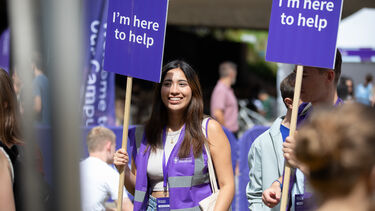Callum Millar (Lloyds Banking Group)

Callum studied BSc Economics between 2018 and 2021. He currently works for the Lloyds Banking Group on their Commercial Banking Graduate Scheme, where he has the opportunity to do 4 rotations in different teams across the bank, each lasting 6 months. He recently completed the first placement in Payments Sales and will be moving into the Energy Transition & Commodities team next.
Why did you choose to study at the University of Sheffield?
I hadn’t studied Economics or Maths at A-level so a key factor for me was that Sheffield accepted people from different subject backgrounds onto the BA Economics course. Then after the first year I was able to switch from a BA to BSc to focus more on the quantitative side. I also picked Sheffield as my top choice because when I looked around on the open day it came across as a really fun and friendly city while also being close to the peak district, which is stunning and great for a day out with mates. Of course its reputation as a Russell Group uni was important too, combined with the flexibility to include a placement year within the course, which allows you to essentially defer your final year and work full-time for a company in your 3rd year.
What was your favourite part of studying Economics, and what surprised you?
My favourite part was definitely the people. Everyone I met on my course was similarly motivated and friendly and some of my best friends now after university also studied Economics with me!
I was genuinely surprised by how many different career insights were provided through talks, networking sessions, mentoring and other initiatives. For example, in both my first and second year I attended a Q&A session with lots of different Sheffield alumni, from CFOs to government economists. Then there’s the e-mentoring scheme where you can apply to be matched with a certain Sheffield alumni mentor, which greatly helped me with deciding what kind of areas I wanted to work and apply for.
What job are you doing at the moment, and how has your study helped you with your career goals?
I currently work for Lloyds Banking Group on their Commercial Banking Graduate Scheme, where I have the opportunity to do 4 rotations in different teams across the bank, each lasting 6 months. This was a key attraction given I find lots of areas of banking and finance interesting and want to build a broad set of skills and experiences in the sector. I recently completed my first placement in Payments Sales and my current area is Infrastructure & Project Finance (funding large infrastructure projects like wind farms), and I’ll be moving into the Energy Transition & Commodities team next (helping to support clients in the Oil, Gas and Commodities sectors).
Studying Economics at Sheffield has helped in a few big areas for me: Firstly, Economics as a subject has allowed me to understand what happens in the world in much greater detail, such as why interest rates move up and down, or how global trade can affect inequality within countries. Second, I am currently studying towards the CFA (Chartered Financial Analyst) qualification that lots of financial professionals take to improve and demonstrate their understanding of key topics in the financial sector, similar to a Masters. Quite a significant chunk of the content is Economics and Statistics, so having covered both in my degree is very handy - though I think that point would apply to whatever learning people pursue after uni. And finally, as mentioned already, the school encourages third year placements where you can spend a year working in an Economics-related role full time. For example, I spent my placement year at Lloyds in the Risk division learning how banks work and how to code. The experience ultimately helped me gain a place on the graduate scheme. The University has lots of resources to help such as careers advisors, mock interviews, and practice tests, but ultimately it’s your own decision as to whether to pursue a placement. Getting one is hard work but I would still strongly recommend it as a way to find out what type of areas you find interesting.
I was genuinely surprised by how many different career insights are provided through talks, networking sessions, mentoring and other initiatives.
Callum Millar
What tips would you give future and current students about their studies?
I found one of the best ways I learnt stuff was by talking it through with course mates, particularly tricky topics and questions (Econometrics comes to mind here!), because then if we still didn’t understand it fully, we could all benefit by asking the lecturer directly in a lecture or one-to-one session.
Crucially, I’d strongly encourage you to do other things beyond the course. Whether that’s being part of a sports team, doing charity work, or in my case, leading a team within the University’s Investment Society. It’s not just useful for interviews, it’s also what makes university a lot of fun.

Visit us
Discover what sets Sheffield apart at our undergraduate open days on Saturday 21 June and Saturday 5 July 2025.
